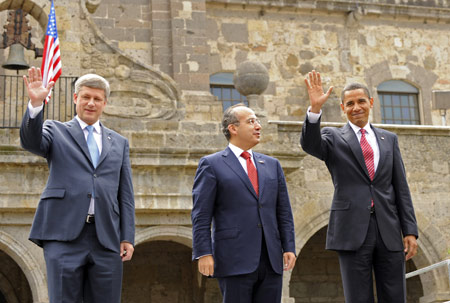Leaders of Mexico, Canada and the United States, who have just wrapped up a two-day summit here, said Monday that they had reached some consensus and agreements on cooperation on environment, trade, immigration and some other things, and discussed the post-coup situation in Hondurus.

|
|
Canada's Prime Minister Harper, Mexico's President Calderon and U.S. President Obama (L-R) pose for pictures after the North American Leaders' Summit in Guadalajara, Mexico, August 10, 2009. The summit concluded here on Monday. [Xinhua]
|
"The agreements would push forward the standardization of our products, as well as animal and plant hygiene, and could boost economic competitiveness in the region," Mexican President Felipe Calderon told a joint press conference with his U.S. counterpart Barack Obama and Canadian Prime Minister Stephen Harper.
In recent years, the United States has twice sealed off its borders to Mexican products out of food hygiene concerns. In one incident, tomatoes and peppers were excluded due to salmonella fears, and in the second incident pork products were rejected.
Calderon said Mexico and the United States had agreed to launch plans to modernize the customs procedure on their border, seeking to boost security and economic competitiveness.
Obama said "we have to boost trade, not restrict it."
Calderon said Mexico will not allow a recent visa rift with Canada to damage bilateral relationship.
He also said Mexico would work with Canada to ensure that Mexicans would not abuse what he called "Canada's generous refugee system."
At the press conference, Harper said both Canada and Mexico need better legislation to cope with the immigration issue.
"We will continue to work with the Mexican government, but it is very difficult for both governments," Harper said, adding tackling the problem needs "additional tools" from the two parliaments.
Obama said the United States would fix what he called as the country's "broken immigration system."
"We have a broken system and nobody denies it. It is not fair and we are going to change it."
About 10 percent Mexicans live in the United States, and remittances sent back home by Mexicans are Mexico's second largest source of foreign currency.
The three leaders also restated their backing for a negotiated solution to a constitutional crisis in Honduras, which was triggered by a June coup ousting President Manuel Zelaya.
"Zelaya was removed from office illegally," said Obama, who denied that his country had remained silent over the issue.
Calderon said Mexico would continue to push for Zelaya's return to office, who visited Mexico last week and said the U.S. pressure on the post-coup government was "lukewarm."
"It is not about Zelaya per se," Calderon said. "It is about defending the rights of the Honduran people."
Harper said he also supported the restoration of the rule of law and a democratic government in Honduras.
The post-coup government, led by former legislature leader Roberto Micheletti, has not been recognized by any nation or international body. Micheletti has repeatedly said Zelaya can only return to Honduras to stand a trial for treason.